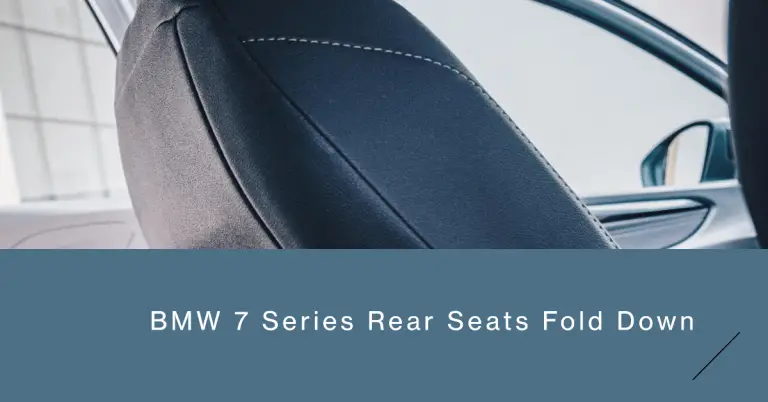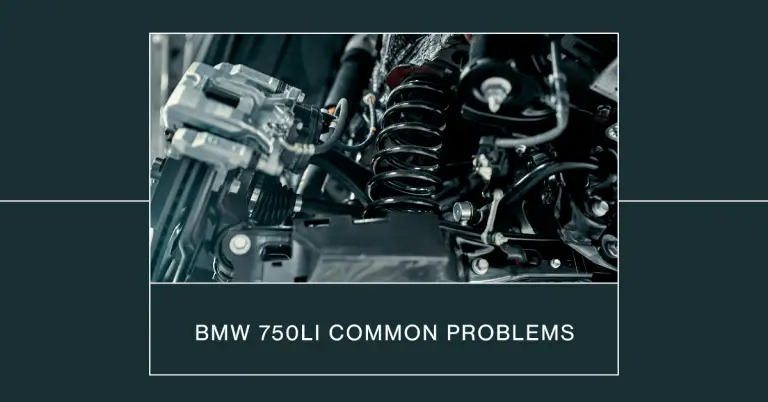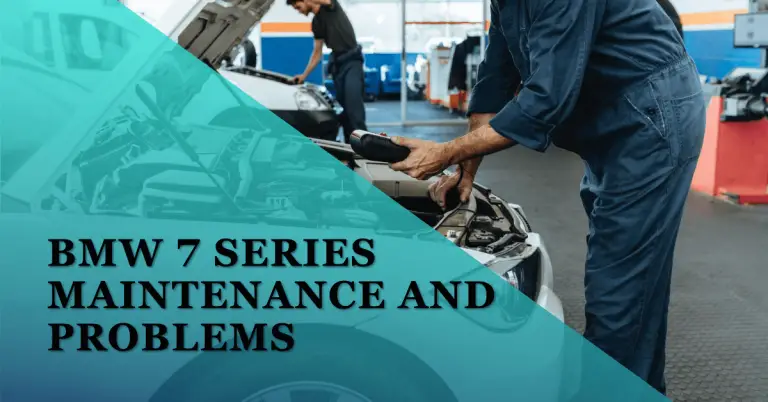Are 7 Series BMWs Reliable? The Complete Technical Analysis
The BMW 7 Series stands as the pinnacle of luxury and performance in the BMW lineup. But with great power comes great responsibility, namely in reliability and maintenance. Prospective BMW 7 Series owners often ask: do BMW 7 Series have problems or reliability issues I should know about?
The short answer is yes, like any complex and powerful luxury vehicle, the 7 Series can develop issues over time. However, many problems are preventable with proper maintenance and early action. In this complete technical guide, we will dive into common BMW 7 Series problems reported by owners over the model years and generations.
Whether engine issues, electrical gremlins, or parts wearing out prematurely, we will break down by system the core trouble areas to watch for buying used or new. Forewarned is forearmed when owning a vehicle as refined and complicated as a 7 Series.
Overview of BMW 7 Series Generations and Changes Over the Years
The BMW 7 Series has spanned six generations since its introduction in 1977:
- E23 (1977-1987) – The first BMW 7 Series luxury sedan. Used a straight-six M30 engine. Known for its handling and build quality.
- E32 (1986-1994) – Added V12 engine option and modern tech like traction control. The 750i was the first 12-cylinder 7 Series.
- E38 (1994-2001) – Increased use of electronics and luxury features like power sunroof. Both V8 and V12 engines offered.
- E65/E66 (2001-2008) – A controversial exterior redesign with technical problems like iDrive. But faster and more powerful.
- F01/F02 (2008-2015) – Returned to classic BMW design and fixed tech issues. Added turbocharged engines and hybrid model.
- G11/G12 (2015-Present) – Current generation with revised styling, gesture control, and advanced driver aids. New six-cylinder engines.
Advancing technology and adding luxury features caused occasional reliability hiccups through the generations. But BMW has improved mechanical robustness and electronics in recent iterations.
Most Common Engine Problems in BMW 7 Series
With powerful six, eight, and twelve-cylinder motors pushing these large luxury sedans, engine problems periodic crop up in the 7 Series:
N63 V8 Twin Turbo Engine Issues
The BMW N63 8-cylinder twin turbo engine debuted in 2008 on the F01/F02 7 Series models, replacing the N62 V8. The force-induced N63 boasted 400 horsepower and 450 lb-ft torque in the 750i. However, the N63 V8 proved plagued with serious reliability issues requiring expensive repairs:
- Timing chain failures – The timing chain wears prematurely, skips timing, and can leave drivers stranded when it fails. Repair costs often exceed $10k.
- Oil leaks – The N63 is prone to multiple oil leaks from gaskets and seals which drip oil externally or allow oil to mix with coolant internally.
- Fuel injector failures – Faulty fuel injectors on the N63 fail frequently and require replacement of all eight injectors.
- Carbon buildup – Carbon gunks up the intakes and valves due to direct injection and the turbochargers. Causes rough running.
- Turbocharger failures – Turbos fail and require $3,000+ replacements. They can fail as early as 50k miles.
To rectify the N63 issues, BMW introduced the marginally improved N63TU version starting in 2013. But the N63’s woes prompt many buyers to seek six-cylinder 7 Series models instead for more trouble-free operation. Those considering an N63-equipped 7 Series should ensure the timing chain service is completed and get a PPI.
N62 V8 Leaks Oil When Old
The N62 8-cylinder engine powered E65 and early F01 7 Series from 2001-2010. Notoriously thirsty for oil when reaching higher miles, the N62 tends to leak from multiple points:
- Valve cover gasket – The valve cover gasket notoriously leaks oil externally. Replacement gaskets run around $500 in parts.
- Valve stem seals – Hardened valve stem seals allow oil to burn in the combustion chambers. Blue smoke from the exhaust is a telltale sign.
- Oil pan gasket – Oil leaks from the oil pan gasket are common on the N62. The gasket replacement alone can cost $1,000 in labor.
- Timing chain guides – Bad timing chain guides break down and clog oil passages while spreading debris.
The N62 consumes 1 quart of oil every 750-1250 miles once high mileage sets in. Carry extra oil if you operate a N62 V8 7 Series.
Water Pump and Thermostat Failures
The water pump circulates coolant through the BMW 7 Series engine while the thermostat regulates temperature. But problems can arise with both:
- Plastic impellers on the water pump wear and warp over time, reducing flow. Replacement is recommended every 60k miles.
- Electric water pumps on V8 models fail, halting coolant circulation. Causing rapid overheating.
- Thermostats stick open/closed and should get replaced every 60k miles as preventative maintenance.
Bad water pumps and thermostats create overheating conditions if not addressed quickly. Watch engine temperature gauges for any unusual movement.
Transmission Issues to Watch For in BMW 7 Series
Two types of transmissions transfer power in the BMW 7 Series:
ZF Automatic Transmission Problems
Most 7 Series utilize a ZF 8-speed automatic transmission. Common problems include:
- Harsh shifts – Delayed and firm shifts, especially when cold. Indicative of low transmission fluid or faulty mechatronic sleeve.
- Slipping between gears – Transmission slips and bucking between gears points to low fluid or internal wear.
- No movement – Complete transmission failure will leave the car with no gear engagement. Requires rebuild or replacement.
- Mechatronic unit – This transmission computer is prone to breakdowns, causing various shift and engagement problems.
Replacing the mechatronic sleeves and refreshing the transmission fluid can restore shifting performance in ZF automatics. Cost is $1200+ in parts and labor.
Transfer Case Failures in AWD Models
AWD BMW 7 Series utilize a transfer case to send power to the front and rear axles. Two issues can arise at high mileage:
- Leaking transfer case fluid due to seals drying out. Top off the fluid.
- Complete transfer case failure with the vehicle only able to operate in rear-wheel drive mode. Requires rebuilding or replacing the transfer case.
Clunking or grinding noises during shifting point to transfer case problems.
Electrical Faults and Gremlins
With their advanced electronics and technology, BMW 7 Series have a host of potential electrical issues:
Faulty Wiring Harnesses
The wiring harnesses, cables, and connectors are prone to breaking down over time. Common glitches include:
- Loss of power to various controls like seats, mirrors, door locks due to broken wires
- Electrical short circuits causing blown fuses when wires chafe and ground out
- Check engine lights, warning lights, and erratic gauge behavior from bad ground connections
- Component failures from deteriorated power supply wires and relay/module connectors
Finding and repairing bad wiring is challenging. Replacement harnesses run $800-$2500+ in parts alone.
Instrument Cluster Failures
The speedometer, gauges, mileage, and warning lights on the instrument cluster operate from a printed circuit board. But failures like:
- Gauges drop out/give false readings
- Warning lights short out
- Blank/dead clusters
Are somewhat common in BMW 7 Series models. Ddash repairs run $800-$1500+ for parts and labor.
Power Window Regulator Problems
The window regulator motors lift the glass vertically and wear out over time:
- Windows drop down suddenly – failure of the window regulator motor or gear assembly.
- Slow/hesitant operation – indicative of a failing window motor.
Replacement regulators are $300-$600 per window from BMW. Shop around for cheaper aftermarket versions.
Suspension and Steering Problems
Two areas impact the BMW 7 Series ride quality and handling – the suspension and steering systems:
Air Suspension Compressor Failures
Many modern BMW 7 Series use electronic air suspension for a refined, adjustable ride. Common faults include:
- Sagging suspension – air leaks prevent the pneumatic springs from inflating fully.
- Suspension warnings – faulty height sensors trigger warning lights unnecessarily .
- Compressor failure – the pump stops being able to inflate the air springs.
Expect to replace leaking air struts and drying out air lines as the system ages. Air compressor repairs run $1500+.
Steering Rack Leaks
The hydraulic steering rack on BMW 7 Series forms the critical link between your wheel inputs and changing direction. But fluid leaks from the steering rack bushings and seals are prevalent on higher mileage 7 Series.
Signs of leaking steering fluid include:
- Spots of fluid under the car – inspect the steering rack for wetness
- Tight or variable steering feel – low fluid levels from leaks reduce assist
- Clunking noises over bumps – worn rack bushings allowing movement
Leaks necessitate steering rack seals replacement or full rack rebuilds. Costs are around $800+ in labor.
Brake Problems Plaguing BMW 7 Series
Advanced braking systems provide the stopping power for these high performance luxury sedans. But a few issues arise:
Carbon Ceramic Brake Rotor Cracking
The carbon ceramic rotors on models like the Alpina B7 and M760Li sometimes develop cracks from heat stress, reducing braking power and requiring replacement at around $9500 per set from BMW.
Brake Caliper Failures
Sticky brake calipers dragging reduce pads life span and cause excessive heat buildup and fires in extreme cases. Lubricating caliper slides can temporarily fix sticking. But outright caliper failure necessitates $600+ per caliper replacements.
Interior Quality Problems
BMW 7 Series cabins pamper occupants in opulence. But with extensive luxury features comes potential for defects:
Premature Wear of Finishes
Top grain leather upholstery, genuine wood accents, and aluminum/chrome trim and controls wear out faster than expected, showing scratches, cracks, andgloss loss that belies the price.
Faulty Navigation and Entertainment Systems
Glitchy iDrive systems, pixelated screens, distorted sound, and software bugs plague BMW navigation and sound systems. Expensive dealer repairs are often the only fix.
Conclusion
The BMW 7 Series stands at the top of BMW’s model range bringing together advanced technology, visceral performance, and enveloping luxury. However, with great capability comes occasional issues, especially as these flagship models age.
Being aware of problem areas such as the N63 V8 engine, air suspension, electrical faults, and interior wear can help buyers make educated used car decisions. While no model is 100% problem-free, proper preventative maintenance, early diagnosis, and prompt repairs when issues arise can help maximize 7 Series reliability and enjoyment.
Considering a pre-purchase inspection and choosing later model years can also mitigate the risk of problems. For those looking for BMW’s ultimate luxury driving machine, understanding the vulnerable areas empowers owners to take preventative action and make repairs before small issues balloon into major headaches.





